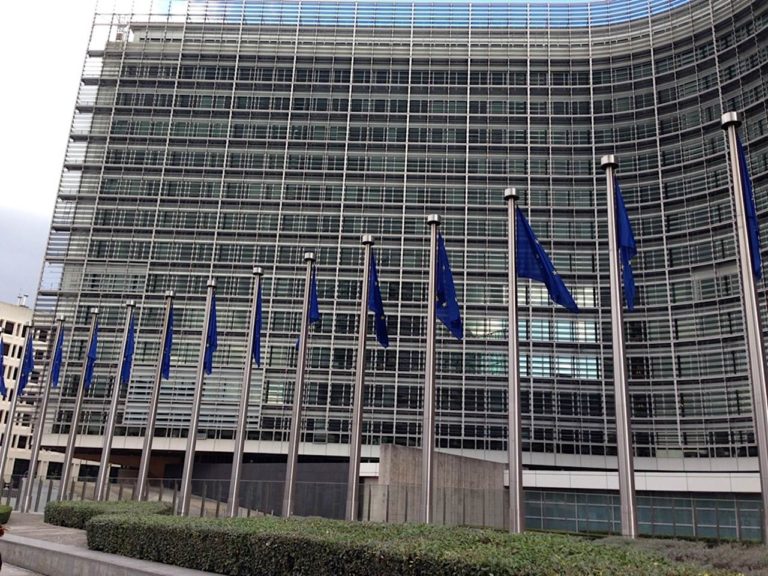Highlights from the Past Week
CW 7 / Monday, 13 to Thursday, 16 February: Plenary Sessions Week (Strasbourg);
CSAM – COUNCIL REINFORCING COORDINATORY ROLE: In its compromise proposal from 16 February (PDF), the Swedish Presidency is reinforcing the role of the public authorities responsible for coordinating the combatting of sexual abuse of minors on the Internet, in particular in the processing of removal orders.
The Presidency emphasises that responsibilities for sexual abuse of minors on the Internet can be divided among several public authorities at the discretion of the respective state. In parallel, new conditions for the removal of content are set out, in particular the ability of the hoster to reinstate the content online if necessary.
ISPs must block content “without delay” after receiving the order, and they must also be able to make it available again. Blocking becomes a last resort that can be used if what are referred to as “equally effective and less intrusive measures” do not work.
The current compromise proposal is on the Law Enforcement Working Party’s agenda on 24 February. (see Contexte, paywall, FR)
DIGITAL SERVICES ACT I – DRAFT IMPLEMENTING REGULATION PUBLISHED: Last week, the Commission published the draft implementing regulation for the Digital Services Act (DSA). The deadline for feedback is 16 March 2023.
The DSA gives the Commission the power to adopt implementing acts to detailed arrangements on issues identified in Article 83 of the Act. This pertains to:
- the procedures in Articles 69 to 72 regulating aspects of the Commission’s investigatory and enforcement powers,
- the hearings in Article 79,
- the negotiated disclosure of information provided for in Article 79.
This implementing regulation will lay down rules on all procedural practical arrangements in Article 83 of the DSA. Its adoption was already scheduled for the fourth quarter of 2022.
DIGITAL SERVICES ACT II – PLATFORMS PUBLISH USER NUMBERS: Friday was the deadline for online platforms to publish their user numbers. The European Commission will now start to examine the numbers of companies in the EU and their qualification as very large online platforms and search engines under the Digital Services Act (DSA). (see press release COM)
There are 18 self-identified very large online platforms: (social media) Facebook, Instagram, LinkedIn, Pinterest, Snapchat, TikTok, Twitter, YouTube; (app stores) Google and Apple; (marketplaces) Amazon, Booking, Google Shopping, AliExpress; (search engines) Google and Bing; (others) Google Maps, Wikipedia.
Figures below the threshold announced included: PornHub (33 million EU users), YouPorn (7 million), Airbnb (31 million), Reddit (10.2 million), Telegram (38.5 million), Zalando (30.8 million), as well as eBay, Dailymotion and Spotify (all without figures). (see Clothilde Goujard, Twitter and FindYourVLOP – Spreadsheet)
On Friday, the EU Commission already criticised those companies that did not disclose the number of their users in the EU and called on them to publish their figures as soon as possible. “Some only say they’re below the threshold. That’s not enough. A number is a number”, spokesman Johannes Bahrke tweeted.
DATA PROTECTION – EP COMMITTEE REJECTS EU-US DPF: The Committee on Civil Liberties (LIBE) has published a draft motion for a resolution (PDF) on the EU-US Data Privacy Framework and the EU Commission’s adequacy decision.
The draft motion acknowledges the efforts made in US President Joe Biden’s Executive Order (EO) to lay down limits on US Signals Intelligence Activities, by referring to the principles of proportionality and necessity. However, it points out that the definitions of these principles in the EO are not in line with their definition under EU law and their interpretation by the Court of Justice of the EU (CJEU).
In addition, the motion expresses the Parliament’s regret at the fact that the EO does not prohibit the bulk collection of data by signals intelligence.
Although the Parliament’s resolution is not binding on the European Commission, it will put political pressure on the EU Executive. The draft is to be presented and discussed in the committee on 1 or 2 March. The final resolution could be voted upon in plenary during the week of 17 April. (see Politico Pro, paywall)
ARTIFICIAL INTELLIGENCE – ARDUOUS NEGOTIATIONS CONTINUE: AI shadow rapporteurs met last week for a five-hour meeting. Hopes were high to finalise several important aspects of the regulation. The ambitious agenda included an AI definition aligned with that of the US National Institute of Standards and Technology (NIST), a ban on exporting AI systems based on prohibited practices, biometric categorisation and facial-scrapping databases.
However, none of the agenda items were agreed upon at the meeting and several MPs called for further discussions about the text. The NIST definition seems compatible with the EPP’s transatlantic approach, although more progressive MEPs consider it too narrow, and the related recitals drew some significant criticism. The “high-risk” categorisation was under attack from all sides, with some groups questioning the logic of the proposed text. The issue of prohibiting emotion recognition was also raised, but the EPP is still pushing to have it as a high-risk application.
The next technical meeting is scheduled for 27 February, meaning the co-rapporteurs will have to come up with a new timeline. (see Euractiv)
CYBERSECURITY – NEW COMPROMISE IN THE COUNCIL: The critical and highly critical product categories were subject to heavy change under the latest Cyber Resilience Act compromise circulated by the Swedish EU Council presidency. The text adds significant granularity to class I and class II, dividing them into two and three subgroups, respectively, based on criteria that would also restrict the Commission’s discretion in amending the annex. The “highly critical” category was better defined in relation to NIS2, and the possibility of requiring cybersecurity certification was introduced. The product categories in the two classes were also revised, with 11 moved to the higher class and six downgraded. Consumer products like smart locks and alarm systems were included. (see Euractiv)
MEDIA FREEDOM I – SWEDEN SEEKING SPECIAL STATUS FOR MEDIA: Sweden has proposed a stronger special status for media outlets on online platforms, according to proposed amendments (PDF) to the Media Freedom Act (EMFA).
The EU Presidency suggested forcing big platforms to keep news outlets’ content that goes against their terms and conditions online until they hear back from them. They would also need to wait an “appropriate period” of time if they want to limit a specific media outlet’s post from going viral. Sweden is thus rehashing an idea that was already discussed in the Digital Services Act. (see Politico Pro, paywall, or Contexte, paywall, FR)
MEDIA FREEDOM II – COMPETENCE DISPUTE RESOLVED: The Conference of Presidents confirmed the recommendation on the distribution of competences for the regulation on media freedom. The Committee on Civil Liberties (LIBE) will be included in the work of the lead Committee on Culture (CULT) in the “Article 57+” format. LIBE is given exclusive and shared competences for Articles 4(2) and 20(3). The Internal Market Committee (IMCO) receives shared competence under Article 57. (see Euractiv)
PRODUCT LIABILITY – COMPETENCY IN PARLIAMENT CONFIRMED: Last week, the Conference of Presidents of the European Parliament confirmed the proposals of the Conference of Committee Chairs on the distribution of competencies on the Product Liability Directive (PLD) and the Artificial Intelligence Liability Directive (AILD) without discussion.
The PLD will be under the joint leadership of IMCO and JURI. The AILD will be spearheaded by JURI, with some shared competencies with IMCO and LIBE. (see Euractiv)
INFRASTRUCTURE LEVY – BACK AND FORTH CONSULTATION CONTINUES: While the consultation on the future of the connectivity sector has already been expected several times, time and again, the deadline has passed. It remains unclear when exactly the time will surface.
Last week, all indications were that it would finally be the week of 27 February. Commissioner Breton told Reuters that he wanted to present the consultation during the Mobile World Congress.
Now, however, Politico Pro (paywall) reported on Monday that the consultation should be published this week – together with the Gigabit Infrastructure Act.
TELECOMMUNICATIONS – PARLIAMENT GIVES GREEN LIGHT TO SATELLITES: A new network of European IRIS² telecommunication satellites will be active from 2024, following the green light by Parliament on Tuesday.
With a budget of 2.4 billion Euro, the EU will be able to set up the new Infrastructure for Resilience, Interconnectivity and Security by Satellite (IRIS²), Europe’s first multi-orbital satellite constellation. The scheme will ensure the EU’s strategic autonomy in the field of secure government communications.
In negotiations with EU ministers, MEPs made sure to strengthen the system’s environmental provisions and sustainability, preventing space debris proliferation and light pollution and to compensate for the emissions generated by the system’s operation. (see EP press release)
BLOCKCHAIN – COMMISSION LAUNCHES “REGULATORY SANDBOX”: The Commission last week launched the European Regulatory Sandbox for Blockchain. This sandbox will provide legal certainty for decentralised technology solutions, including blockchain, by identifying obstacles to their deployment from a legal and regulatory perspective and providing legal advice, regulatory experience and guidance in a secure and confidential environment. It should also allow regulators and supervisors to enhance their knowledge of cutting-edge blockchain technologies and share best practices through dialogues.
Running from 2023 to 2026, the Sandbox will support 20 projects annually, including public sector use cases on the European Blockchain Services Infrastructure (EBSI) – a multi-country project under the Digital Decade supported by the Commission, all Member States, Norway and Liechtenstein.
The first call will be open until 14 April 2023 (see COM press release).
COPYRIGHT – COMMISSION TAKES MEMBER STATES TO ECJ: The European Commission has taken six and five Member States respectively to the ECJ for failure to transpose the DSM Directive and the SatCab2 Directives. In both instances, the Member States concerned are Bulgaria, Finland, Latvia, Poland and Portugal, while Denmark is also included in the case of the DSM Directive. (see press release COM)
OPEN DATA – COMMISSION ACTS ON FAILURE TO TRANSPOSE: EU rules on open data and the re-use of public sector data have also not been transposed in time in several Member States. Accordingly, the EU Commission has taken Belgium, Bulgaria, Latvia and the Netherlands to the ECJ. (see press release COM)
FRANCE – TAKE-DOWN FROM ONLINE LIVE SPORT EVENTS: L’Informé (paywall, FR) has published the document adopted by the College of Media Regulators as the basis for the recently signed agreement between the Media Regulator for the Protection of Sports Programmes (APPS), the FFTélécoms (Orange, SFR, Bouygues) and the Iliad Group to strengthen the protection measures for sports events.
In the broad outlines, ISPs commit to “make every effort” to ensure that blocking measures take effect “upon receipt of the identification data transferred by the media regulator […] and within time limits that allow for the effective protection of rightholders’ rights”. They must also “set up an automated system to receive identification data from [websites] that are not identified at the time of the court order”.
Rightholders, on the other hand, are pledging not to seek coercive measures, except against recalcitrant ISPs. As provided in the law, the cost of blocking will be “shared between the parties”. It goes on to say that, “The apportionment of the payment of costs will be determined in accordance with the blocking techniques”. The signatories pledge to inform the media regulator on a monthly basis for the first year. A steering committee will be charged with monitoring the proper implementation of the agreement established by the media regulator. (see Contexte, Paywall, FR)
FRANCE – EXTENDING AGE VERIFICATION TO SOCIAL MEDIA: Last week, deputies of the Culture Committee of the French National Assembly voted to extend age verification requirements to the principal forms of social media.
The bill still has to pass the plenum and the senate. However, the French Minister for Digital Affairs, Jean-Noël Barrot, has repeatedly said that the existing age verification rules for websites with pornographic content should be extended to companies such as Meta and TikTok. (see Politico Pro, paywall)
Relevant Publications, including from the EP Think Tank:
- Plenary round-up – February II 2023 (At a Glance);
- Path to the digital decade programme (Briefing);
- Online age verification methods for children (At a Glance);
- Social approach to the transition to smart cities (Study);
A Selection of the EU Commission’s Consultations
- Digital Services Act – implementing regulation – Feedback period, 16 February to 16 March 2023
- 2023 Strategic Foresight Approach – Call for Evidence: 13 February to 13 March
- New product priorities for Ecodesign for Sustainable Products – Call for Evidence: 31 January to 12 May 2023 (extended)
- VAT in the digital age – Feedback on the regulation: 8 December 2022 to 4 April 2023
- Digital fairness – fitness check on EU consumer law – Consultation: 28 November 2022 to 20 February 2023
Outlook for the Current Week
You can find a list of the upcoming dates of the European Parliament here. The meeting calendar for 2023 is available here (PDF).
An overview of the most important dates of the Council week can be found here and the meeting calendar can be accessed here.
The official calendar as well as the programme of the Swedish Presidency can be found on the associated website.
Included among the Council dates are:
Summits and Ministerial Meetings:
- Foreign Affairs Council, Monday, 20 February – Agenda, A Items, A Items Addition 2, Background Brief;
- General Affairs Council, Tuesday, 21 February – Agenda, A Items, A Items Addition 1, Background Brief;
Preparatory Bodies:
- Working Party on Competitiveness and Growth (Industry) (incl. Chips Act, Green Deal), Monday, 20 February (Agenda);
- Working Party on Consumer Protection and Information, Monday, 20 February (Agenda);
- Working Party on Telecommunications and Information Society, Tuesday, 21 February, Agenda;
- Working Party on Competitiveness and Growth (Internal Market) (incl. SMEI), Tuesday, 21 February (Agenda);
- Working Party on Tax Questions (Direct Taxation), Tuesday, 21 February (Agenda), Wednesday, 22 February (Agenda) and Thursday, 23 February (Agenda);
- Working Party on Cyber Threats, Tuesday, 21 February (Agenda);
- Audiovisual and Media Working Party (incl. EMFA), Tuesday, 21 February (Agenda);
- Working Party on Intellectual Property (Copyright), Tuesday, 21 and Wednesday, 22 February (Agenda);
- Horizontal Working Party on Cyber Issues, Wednesday, 22 February and Friday, 24 February;
- Standing Committee on Operational Cooperation on Internal Security (COSI), Wednesday, 22 February (Agenda);
- Working Party on Cooperation in Criminal Matters (COPEN), Thursday, 23 February (Agenda);
- Working Party on Law Enforcement (Police) (incl. CSAM), Friday, 24 February (Agenda);
- COREPER I, Wednesday, 22 February;
Information on the weekly Commission meeting can be found on the Commission’s website in the preview (PDF) or (at short notice) in the current agenda. On 26 April, the recommendation on tackling online piracy of live sporting events is expected.
The following topic is on the agenda for the coming week:
- Orientation debate on competitiveness – follow-up to the European Council
You can find the judicial calendar of the ECJ here. There are no meetings this week.
European Parliament Committees
CW 8 / Monday, 20 to Friday, 24 February: Green Week (no meetings);
LIBE Committee (Civil Liberties)
Current Meetings
- None
Further Meetings (Calendar)
- Wednesday, 1 March, 9.00-12.30 and 14.30-18.30 (Brussels)
- Thursday, 2 March, 9.00-12.30 and30-17.30 (Brussels)
JURI Committee (Legal Affairs)
Current Meetings
- None
Further Meetings (Calendar)
- Monday, 27 February, 15.00-18.30 (Brussels)
- Tuesday 28 February, 9.00-12.30 and30-18.30 (Brussels)
Dossiers Timetable (2 February 2023)
ITRE Committee (Industry)
Current Meetings
- None
Further Meetings (Calendar)
- Thursday, 9 March (Brussels)
Dossiers Timetable (16 February 2023)
IMCO Committee (Internal Market)
Current Meetings
- None
Further Meetings (Calendar)
- Wednesday, 1 March, 9.00-30 and 14.30-18.30 (Brussels)
- Thursday, 2 March, 9.00-30 (Brussels)
Dossiers Timetable (January 2023)
CULT Committee (Culture)
Current Meetings
- None
Further Meetings (Calendar)
- Wednesday, 1 March, 9.00-12.30 and 14.30-18.30 (Brussels)
- Thursday, 2 March, 9.00-12.30 (Brussels)
PEGA Committee (Pegasus Committee of Inquiry)
Current Meetings
- None
Further Meetings
- Tuesday, 28 February, 9.00-12.30 and 15.00-18.30 (Brussels)
- Thursday, 16 March, 9.00-11.00 (Strasbourg)
INGE2 Committee (Special Committee on Foreign Interference)
Current Meetings
- None
Further Meetings (Calendar)
- Tuesday, 28 February, 14.00-18.00 (Brussels)
Further Parliamentary Calendar Dates
- CW 9 / Monday, 27 February to Thursday, 2 March: Committee Meetings Week (Brussels);
- CW 10 / Monday, 6 to Thursday, 9 March: Political Group and Committee Meetings Week (Brussels);
- CW 11 / Monday, 13 to Thursday, 16 March: Plenary Sessions Week (Strasbourg);




